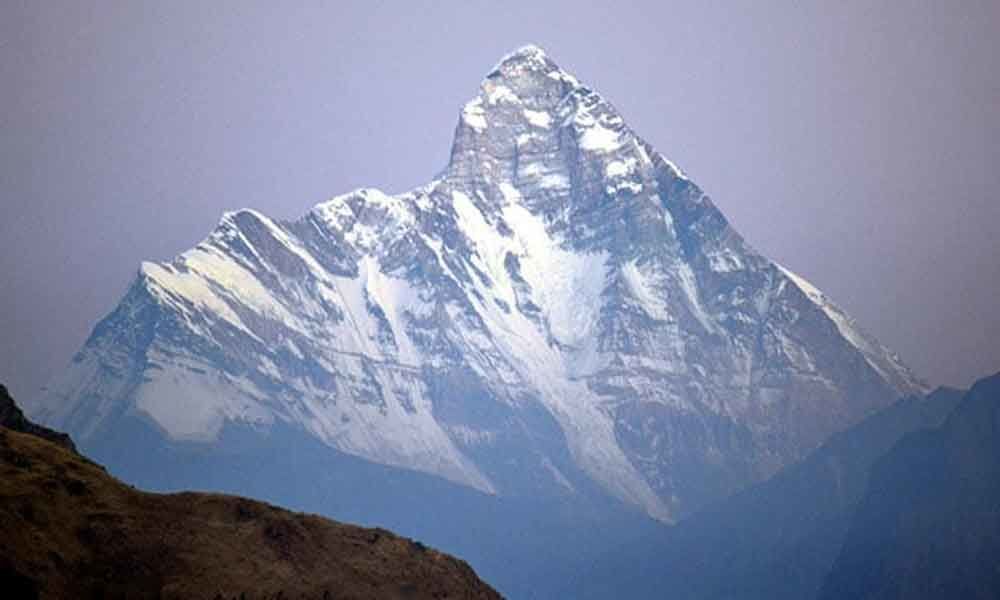Four rescued, eight still missing on avalanche-hit Nanda Devi

Four British climbers have been rescued from the avalanche-hit Nanda Devi peak in Uttarakhand, Indian authorities said on Sunday, as a frantic search continued for eight other mountaineers still missing on its treacherous heights.
NEW DELHI: Four British climbers have been rescued from the avalanche-hit Nanda Devi peak in Uttarakhand, Indian authorities said on Sunday, as a frantic search continued for eight other mountaineers still missing on its treacherous heights.
Helicopters airlifted the rescued group to safety after they were spotted early Sunday at a base camp near India's second highest mountain, the 7,826-metre (25,643-foot) Nanda Devi.
Scores of emergency workers were combing the peaks on foot and using two choppers as rescue operations entered a second day, having been hampered by rough weather on Saturday.
The eight missing climbers - four Britons, two Americans, an Australian woman and an Indian - were last week set to scale an unclimbed summit in the mountain range, which includes the world's 23rd highest peak.
The rescue effort for the missing climbers began on Saturday when they did not return to their base camp, but it may take days to trek to the avalanche-hit area where they were last known to have been.
"The first aerial recce has concluded," said Vijay Kumar Jogdanda, a Pithoragarh district official.
"There were only tents spotted, but no human presence. The second helicopter has left for the recce."
He added, "Chances of survival are bleak," and confirmed the occurrence of an avalanche that is feared to have caught the climbers in the area around India's second-highest peak. Officials have declined to identify them.
A team of ten to 15 rescuers, comprising police, disaster response personnel and administrators has also fanned out to track down survivors, said Tripti Bhatt, an official of the Uttarakhand State Disaster Response Force (SDRF).
The casualty rate in the region is almost five times higher than on Mount Everest, the world's tallest peak, she added.
Meanwhile, authorities said the four rescued were not part of the larger group but were in touch with them until May 26, a day before the avalanche struck the mountain.
"They were climbing separately but were in touch with the larger group. Heavy snowfall and bad weather had left them stuck at the base camp," R C Rajguru, police chief of Pithoragarh district - where the peak is located - told AFP.
Rajguru said there was no certain information on the location or safety of the mountaineers, who started their ascent on May 13.
The group, led by British climber Martin Moran - who has successfully climbed the mountain twice in the past - had initially set out for the Nanda Devi peak but a later post on his Facebook page hinted that they were attempting to scale a virgin peak in the region.
The group was expected to report back to the Munsiyari base camp on May 26 but a porter stationed at the camp reported to authorities that the group remained missing on May 31, prompting a search operation.
The British High Commission in New Delhi said they were in touch with the local authorities "following reports that a number of British nationals are missing in the Indian Himalayas".
Pithoragarh district magistrate Vijay Kumar Jogdande said that Sunday's search operation continued for seven hours in which the four climbers, including a woman, were rescued from the base camp.
The mission will continue on Monday, with two choppers scanning the area.
"We are hopeful to get some clues but its not an easy task," said Jogdande, adding the climbers were likely trekking heights above 6,000 metres when the avalanche struck amid ongoing heavy snowfall.
Hundreds of climbers from across the world visit India to scale mountains located across the Himalayan belt, but the twin peaks of Nanda Devi are the toughest to scale.
The first successful ascent to the Nanda Devi summit was in 1936.
India has 10 peaks above 7,000 metres, including Kangchenjunga - the world's third highest - sandwiched between India and Nepal.
Four Indians were among 11 climbers that died climbing Mount Everest in the latest season that ended this week amid allegations of overcrowding on the world's highest peak.
The deaths caused massive outrage, with mountaineering experts criticising the government of Nepal for giving permits to anyone ready to pay $11,000, letting rookie climbers risk their lives and those of others on the slopes.

















